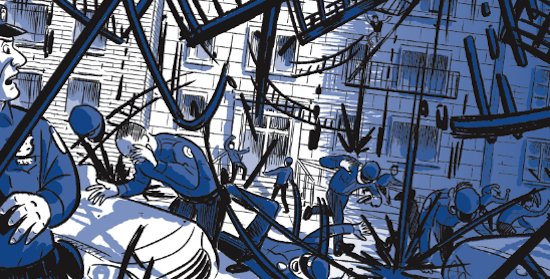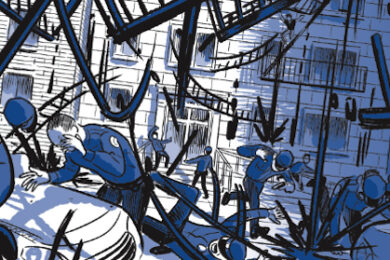How about some ace comics to help lighten everybody’s troubles? Pleased to welcome Joel McIver and Pete Redrup to the column this month. Onward then!
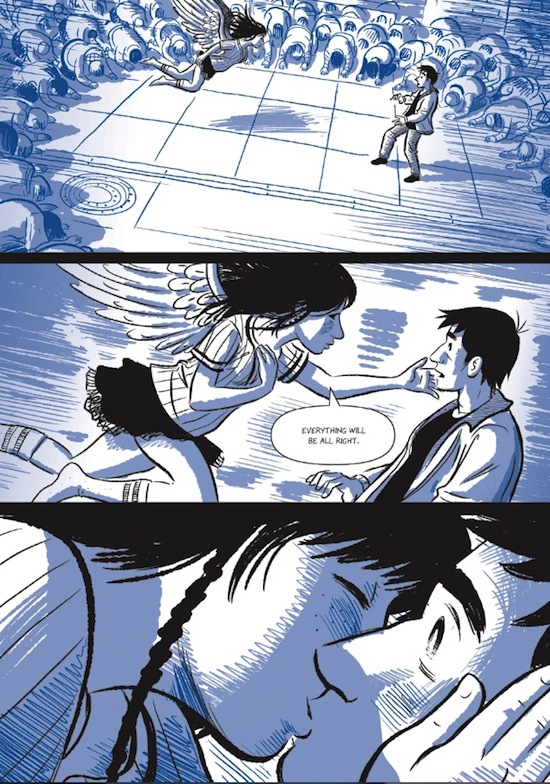
Scott McCloud – The Sculptor
(pub. First Second)
What if you made a deal with Death for your utmost desire to come true? Except that it gets more complicated than you ever could have expected and even Death, checking in a few days later, is surprised how wrong it’s going. The Sculptor is a beautiful, enthralling story, both in how it is told and drawn. One of those stay-up-way-past-your-bedtime to finish books. It tackles the big themes – Love (at first sight, too), Art, Legacy, what’s really Important in Life, as well as how absolutes, principles, and subjectivity all come into play with these. This is a book for any self-absorbed artist who believes in Art above all else, and at all costs. And of course for anyone who’s ever been in a relationship (romantic or platonic) with such an artist. McCloud handles this excellently, getting the tone right for all involved. David Smith is a (very) down-on-his-luck sculptor who, above all else, wants to make a name for himself. After his shady deal with Death, Meg, temporarily dressed as an angel but not without her own issues, swoops into his life. For the first time David actually gets to feel love, and their first real kiss is a wonderfully touching scene packed with all the jitters of that first spoken ‘I love you’. David’s special gift is greatly enhanced when Meg teaches him to listen to himself, and there’s a great visual reference to the beginning of Alejandro Jodorowsky’s The Incal (“in-ner cal-ling”, which is of course all about learning to listen to your true self). If you haven’t yet, definitely pick up a copy of The Sculptor. – Aug Stone
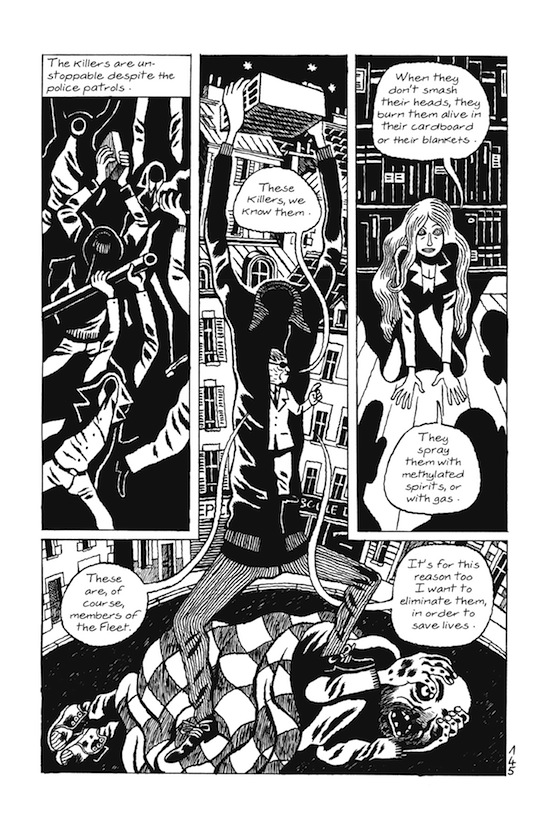
David B. – Incidents In The Night 2
(pub. Uncivilized Books)
David B.’s work is really something special. And this latest installment of Incidents In The Night is no exception. I sang the first volume’s praises back in January but part 2 goes well beyond, taking us into even more wondrous territory. Simply put, the series is a great occult detective story. One cannot help marvel at David B.’s invention and imagination, as well as the phantasmically stylish artwork itself. Early on Police Commissioner Hunborgne shouts “Mystic spies, mercenerial saints, justiciars of the parallel police who messily defend good causes”, but the cast only grows from there. We meet the society of The Eyes, who have watched over the bridges of Paris for hundreds of years, and we’re introduced to the secret geography of the city’s bookstores, each possessing its own unique chimerical qualities. The character of David B. disappeared at the end of the last book and is presumed dead. Meanwhile, his brother Jean-Christophe (focus of B.’s first major work, Epileptic) arrives to join in the Commissioner’s investigation, along with bookshop owner Mr. Llôm and journalist Marie, a team that is falling apart as they face a seemingly unstoppable evil. Poetically told, rich in religious and societal allegory as well as knowledge of occult histories, Incidents In The Night 2 is full of strange delights, both large and small. – Aug Stone
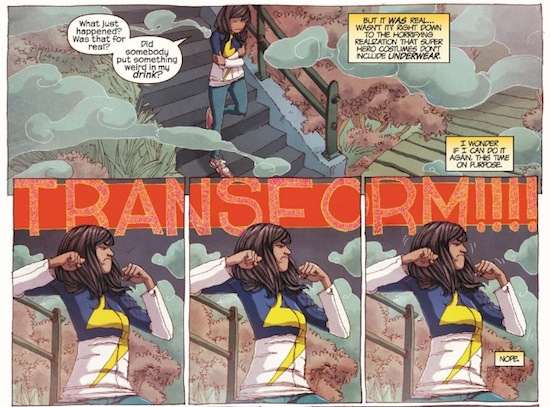
G. Willow Wilson and Adrian Alphona – Ms. Marvel ‘No Normal’ & ‘Generation Why’
(pub. Marvel)
Upon reading the first issue of Ms. Marvel, roughly this time last year, my initial thought was ‘great, amazing, just what the comic world needs. I give it 6 issues’. Thankfully my fortune telling skills would give the Met Office a run for its money and a year later G. Willow Wilson’s story of Kamala Khan, a Pakistani-American teenager, coming to terms with her new powers is well on its way to becoming one of Marvel’s flagship titles. That it’s also a righteous middle finger to those who greet every attempt at encouraging diversity in comics by howling profanities into the void just happens to be an added bonus.
Like most of Marvel’s best books at the moment, Ms. Marvel doesn’t require encyclopaedic knowledge of the publisher’s 75 year history to enjoy, or maintain a spreadsheet of ongoing storylines just to figure out what’s going on. Instead we have a well-paced story of a teenage Muslim girl whose tightrope walk between wanting to fit in with her New Jersey peers and placating her, moderately, religious parents is complicated by the sudden emergence of shape-shifting powers. Throughout the book Wilson cleverly keeps the rest of the Marvel universe at arm’s length and artist Adrian Alphona’s beautiful illustrations give the book the looser feel of an indie comic. With none of the all-consuming universe threatening shenanigans of Hickman’s ongoing Avengers story to worry about, Kamala becomes a character that is, much like Stan Lee’s original Spider-Man, entirely relatable. Cameos from the likes of Wolverine are kept brief, furthering Kamala’s development, and the focus stays firmly on Kamala, her friends, and family.
With Ms. Marvel now one of the best selling books around you can be sure Marvel will be shoehorning her into every situation they can (indeed she’s scheduled to become an Avenger following the upcoming post-Secret Wars reboot). Still in a medium that remains dominated by white, male, muscle-bound hunks and over sexualized, underdressed heroines, Kamala is exactly the kind of character the major publishers need if they’re to halt the continual decline in sales and find new audiences. Even if you normally steer clear of anything carrying the Marvel or DC stamp take a punt on Ms. Marvel. It may not deal in cosmic level threats but in years to come I’m sure this small, charming story will be held up alongside the most important epics that Superhero fiction has produced. – John Power
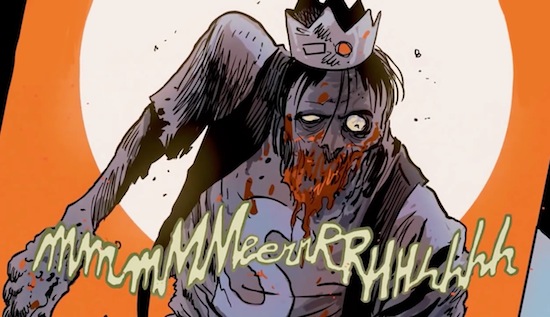
Roberto Aguirre-Sacasa and Francesco Francavilla – Afterlife With Archie ‘Escape From Riverdale’
(pub. Archie Comics)
For over seven decades now Archie Andrews and chums have been the personification of All-American teens, drinking malt drinks, engaging in never-ending yet seemingly chaste love triangles, and generally getting up to wholesome high-school hi-jinks. In contrast by the end of the first story arc of Afterlife With Archie we’ve run the gambit of necromancy, undead cannibals, mass murder, gore, incest, patricide, and several heartbreaking scenes involving much loved pets. Fair to say an all-ages book this ain’t.
Opening with a hit and run that leaves Jughead’s dog a mangled mess on the highway, Archie’s BFF turns to area occultist Sabrina (of Teenage Witch fame) to try and bring the poor mutt back to life. Sadly for the inhabitants of Riverdale the spell only succeeds in resurrecting a blood-crazed undead hound and before you know half the town is on fire and the few survivors are barricaded in the Lodge mansion. Whilst much of the impact of the story comes from seeing these characters in such a radically different light, the book still stands up even if you’ve never picked up an Archie comic before, and so archetypal are the characters that it doesn’t take much to figure out their roles in the ensuing zombie apocalypse.
The creative team of Roberto Aguirre-Sacasa and Francesco Francavilla have done an incredible job of creating a tense, claustrophobic atmosphere as each successive wave of gore-soaked horror washes over the kids and it’s clear from the start that no character, no matter how iconic or beloved, is safe from a grisly devouring. Yes I’m sure it could be seen as exploitative but in the way that many of the best horror films are and as the characters inherent flaws become more exposed by the situation you have to salute Archie Comics for allowing Aguirre-Sacasa to so brutally deconstruct their universe. Whilst I’m sure many of us have felt like peak-Zombie was reached some time ago, Afterlife with Archie, with its nods to Lovecraft and the deconstruction of these all-American icons, breathes fresh air into the necrotic lungs of the genre. – John Power
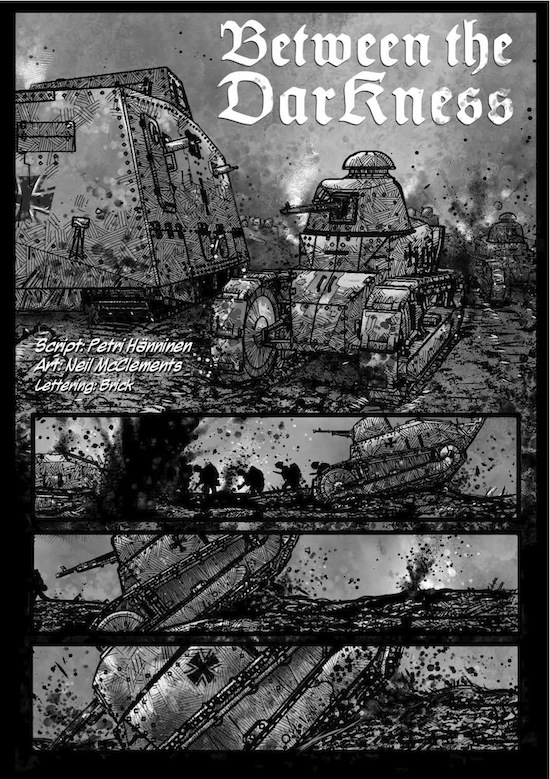
John Clark – To End All Wars
(pub. Soaring Penguin Press)
The double Eisner-nominated World War One anthology To End All Wars has received plaudits for many reasons, over and above its impassioned introduction by Pat Mills (who reminds us that the causes of WWI are more complex and bilateral than most of us think) and the fact that its profits go to Medicins Sans Frontiers. It’s a mighty collection, stretching to 330 pages and covering 27 chapters, each with radically differing artwork – from clean lines to virtual expressionism – and a strongly provocative message. The opening story, The Iron Dice (written and illustrated by Brick) sets out its stall, depicting a modern-day International Court Of Human Rights trial in which the ghosts of Archduke Ferdinand, Emperor Franz Josef, British foreign secretary Edward Grey, and others are brought to trial by the some of the peeved undead soldiers who lost their lives for a cause which few understood. Other chapters such as The Bitter Harvest (Steve Earles and Johnny McMonagle) and The Coward’s War (Jonathan Clode, Matt Goffe) are less trenchant but genuinely heartbreaking. Taken as a whole, To End All Wars is a chilling reminder of how little we really know about WWI and how important a precedent it was for today’s troubled Europe. The hardback edition is sold out, but paperbacks can be ordered here. – Joel McIver
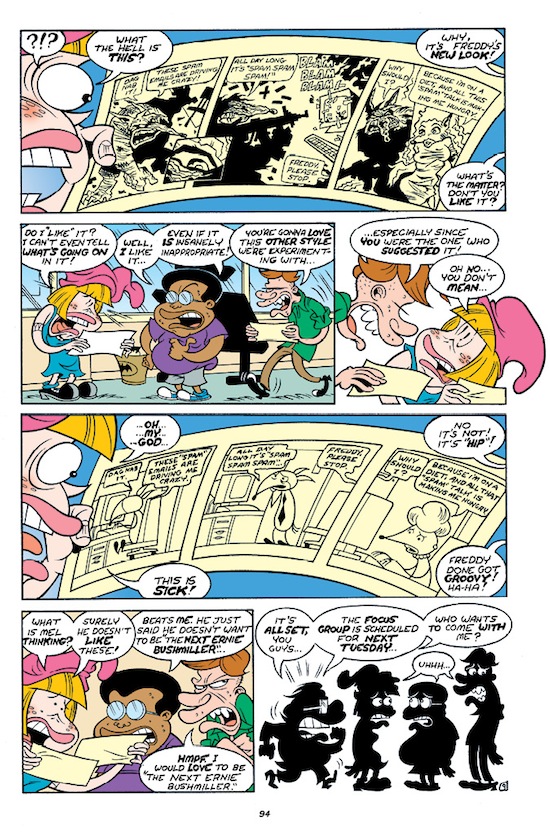
Peter Bagge – Sweatshop
(pub. Fantagraphics)
Sweatshop, the latest from Peter Bagge, is a collection of all six issues of an ill-fated comic from 2003. Originally published by DC, it’s about a group of people who work together on a successful but hackneyed newspaper comic strip, ‘Freddy Ferret’. Led by the reprehensible Mel Bowling, most of the team desperately hope to publish their own work one day. Comics about writing comics are nothing new, but this is very different from something like Daniel Clowes’ Pussey!.
The original plan was for a monthly release schedule, too fast for one person to produce it all. Bagge wrote and sketched out all the stories, and some were then pencilled by other artists. The characters are drawn in Bagge’s signature style of huge heads (all the better to show how angry, awkward, or embarrassed they are) and it’s interesting to see the way in which the others emulate his form. Also included are strips by the various characters, including a superhero called The Peerless Penciller, so as we travel down the rabbit hole we find ourselves reading a comic about comic writers, one of whom writes a comic about a superhero who writes comics.
For those unfamiliar with Bagge, it’s worth noting just how funny he is. Not for him the arch or self-deprecating work of many of his peers. Several of them are satirised here – one story features Comicon appearances of Charles Burns, Ivan Brunetti, and Neil Gaiman, for example. Another has Mel Bowling’s desire for credibility for ‘Freddy Ferret’ resulting in rewrites in the styles of Frank Miller and Chris Ware, to brilliantly comic effect.
Sweatshop has some great stories, but as a book suffers from the treatment by DC. The series was cancelled after just two issues had been released and six written, so there is no graceful arc for the characters. It neither concludes nor fizzles out, but just stops dead, a shame as Bagge had plenty more ideas for stories. Whilst not up there with the brilliant Buddy Bradley books, this is a hugely entertaining read and a worthy purchase for both fans and the curious. – Pete Redrup

